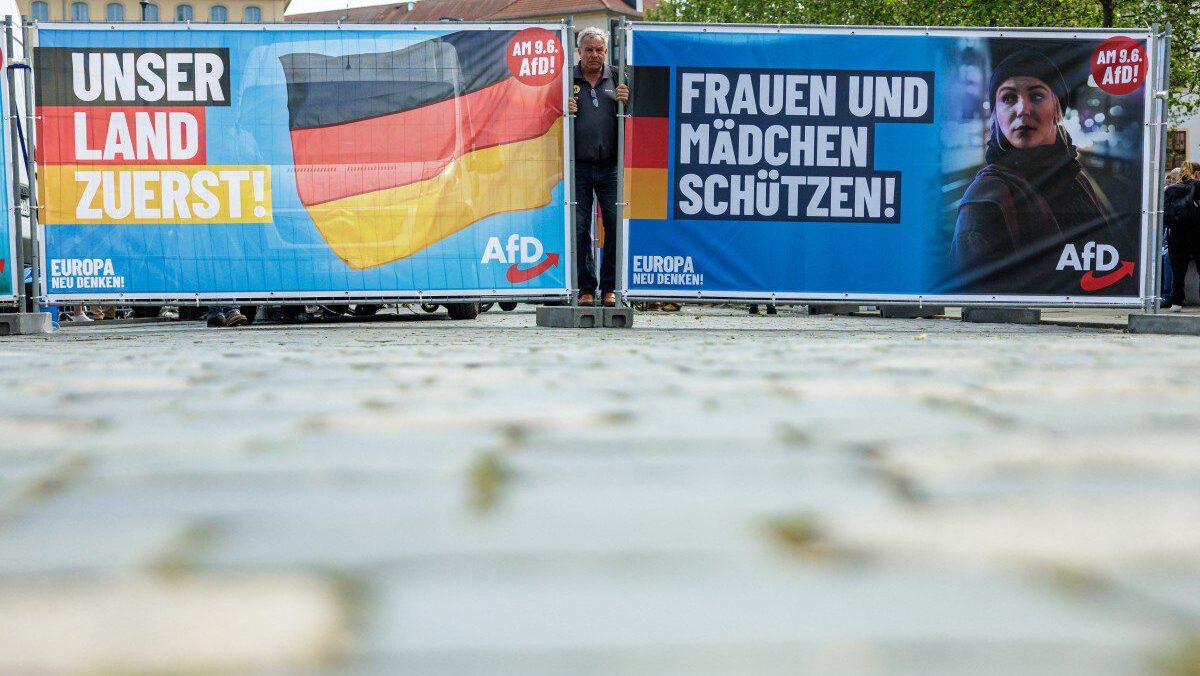
Election posters of AfDreading “Our land first!” and “Protect women and girls!” are pictured during a campaign event for the upcoming European elections in Dresden, eastern Germany on May 1, 2024.
Photo: JENS SCHLUETER / AFP
German federal interior minister Nancy Faeser and the interior ministers of Germany’s sixteen states are debating on the evening of Tuesday, May 7th, whether to increase the police presence at political events in order to protect politicians from physical assaults.
The extraordinary meeting was called after Matthias Ecke, a Social Democrat member of the European Parliament, was brutally attacked by four teenagers on Friday, leaving him hospitalised and in need of surgery. The incident provoked uproar all across the country, and violence against politicians was widely condemned. However, mainstream parties immediately blamed the opposition anti-immigration, anti-globalist Alternative für Deutschland (AfD) for the attack—not for actual involvement in any form, but for “sowing discord” within society.
DANKE! ❤️
— Matthias Ecke 🇪🇺 🌹 (@MattEcke) May 6, 2024
Ich bin überwältigt von eurer Anteilnahme und Solidarität. Das tut wirklich gut und gibt Kraft. Es geht hier aber nicht nur um mich, sondern um alle, die sich aus Leidenschaft politisch engagieren. Niemand soll in einer Demokratie fürchten müssen seine Meinung zu sagen! pic.twitter.com/nt8HHyZhh3
The motives of the perpetrators were still not clear on Tuesday. The four youngsters, aged 17 to 18, have been questioned, their homes searched. Police stated that ‘evidence of right-wing extremist leanings’ was found at one boy’s home and on his mobile phone, but nothing specific was mentioned. The authorities stressed that the crime itself is not currently classified as being motivated by far-right beliefs, and the investigation is still ongoing.
AfD co-leader Alice Weidel said attempts to make political capital from the attack on Ecke were “vile and irresponsible,” and that AfD politicians were themselves frequently assaulted. As we reported, the scapegoating of AfD comes despite statistics revealing that the party’s members suffered the highest number of physical assaults last year—86 in total. It is no surprise that mainstream parties and their media took no notice of an attack on an AfD activist in the city of Koblenz on the weekend. The 25-year-old man had been campaigning on the street, and was later beaten up by unknown perpetrators at a football game. His nose was broken, leaving him needing medical treatment.
Während der Angriff auf einen SPDler bundesweite Entrüstung von den Kartellparteien & ihrer Medien nach sich zieht, wird der brutale Angriff auf den AfDler totgeschwiegen. Den Linken geht es nicht um politische Gewalt, sondern um die richtigen Opfer. https://t.co/UnWcMEY1pV
— Fabian Keubel (@FKeubel) May 6, 2024
In the wake of the assault on Social Democrat Ecke, leftist groups in the European Parliament are calling for the Conference of Presidents, Parliament’s political leadership, to issue a statement condemning the violence (according to an email seen by Politico). “It’s time to show unity against those who want to destroy our democracies,” the leader of the Socialists and Democrats Iratxe García Pérez, said, calling on other political parties “to firmly reject any normalisation, cooperation, or alliance with the far right.”
A recently adopted declaration by the Party of European Socialists (PES) vows to reject any cooperation in the European Parliament with the two right-wing forces, Identity and Democracy (ID)—of which AfD is a member—and the European Conservatives and Reformists (ECR). The document, signed by prominent left-wing leaders, such as Spanish Prime Minister Pedro Sánchez, former Swedish PM and President of PES Stefan Löfven, and former European Commission Vice President Frans Timmermans—labels ID and ECR as “far right” with whom “we will never cooperate nor form a coalition.”
Denmark’s governing Social Democrats, however, criticised the declaration, stating “it is wrong to exclude entire groups of parties and say in advance that you will never, ever cooperate with them.” The party’s lead candidate for June’s European elections, Kristoffer Storm, said the declaration was “very undemocratic,” and “I cannot understand that view of democracy at all.” He added that Stefan Löfven was “a disgrace as Prime Minister of Sweden.”
The Danish Social Democrats have overseen one of the toughest immigration policies in Europe, with Prime Minister Mette Frederiksen declaring three years ago that her aim was to reduce asylum applications in Denmark to zero. It is no wonder her party does not want to rule out cooperation with anti-immigration forces on the Right. According to opinion polls, both ECR and ID are set to make gains at the European elections, and parties on the Left will find it harder to ignore them.
